
The Czech Republic is a Central European country, a member of the European Union, the Organisation for Economic Co-operation and Development (OECD), Organization for Security and Co-operation in Europe (OSCE), the North Atlantic Treaty Organization (NATO), the United Nations. It entertains diplomatic relations with 191 countries of the world, around half of which maintain a resident embassy in the Czech capital city, Prague.

The Prague Spring was a period of political liberalization and mass protest in the Czechoslovak Socialist Republic. It began on 5 January 1968, when reformist Alexander Dubček was elected First Secretary of the Communist Party of Czechoslovakia (KSČ), and continued until 21 August 1968, when the Soviet Union and most Warsaw Pact members invaded the country to suppress the reforms.
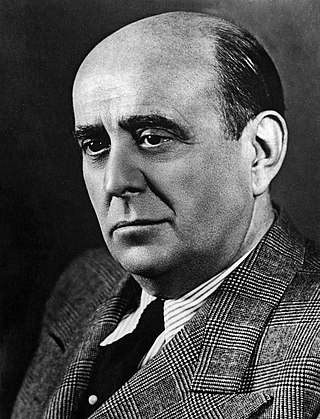
Jan Garrigue Masaryk was a Czech diplomat and politician who served as the Foreign Minister of Czechoslovakia from 1940 to 1948. American journalist John Gunther described Masaryk as "a brave, honest, turbulent, and impulsive man".
With the collapse of the Austria-Hungary at the end of World War I, the independent country of Czechoslovakia was formed as a result of the critical intervention of U.S. President Woodrow Wilson, among others.

The Republic of Turkey (Türkiye) and the United States of America established diplomatic relations in 1927. Relations after World War II evolved from the Second Cairo Conference in December 1943 and Turkey's entrance into World War II on the side of the Allies in February 1945. Later that year, Turkey became a charter member of the United Nations. Since 1945, both countries advanced ties under liberal international order, put forward by the US, through a set of global, rule-based, structured relationships based on political, and economic liberalism. As a consequence relationships advanced under G20, OECD, Council of Europe, OSCE, WTO, the Euro-Atlantic Partnership Council, IMF, the World Bank and the Turkey in NATO.

On 20–21 August 1968, the Czechoslovak Socialist Republic was jointly invaded by four Warsaw Pact countries: the Soviet Union, the Polish People's Republic, the People's Republic of Bulgaria, and the Hungarian People's Republic. The invasion stopped Alexander Dubček's Prague Spring liberalisation reforms and strengthened the authoritarian wing of the Communist Party of Czechoslovakia (KSČ).

Slovakia-United States relations are bilateral relations held between the United States and the Slovak Republic, particularly since the latter's independence in 1993. According to the 2012 U.S. Global Leadership Report, 27% of Slovaks approve of U.S. leadership, with 32% disapproving and 41% uncertain. Both countries are Observer bureau of the BSCE and CBSS.

Czech Republic–Russia relations are the bilateral foreign relations between the Czech Republic and the Russian Federation. Relations have substantially deteriorated in recent years due to events such as the Russian annexation of Crimea in 2014, Russian sabotage of Czech ammunition depot in Vrbětice in 2014, poisoning of Sergei Skripal in 2018 and Russian invasion of Ukraine in 2022.

Neighborly relations exist between Austria and the Czech Republic, two member states of the European Union. Austria gave full support to the Czech Republic's membership of the European Union. The Czech Republic is a member state of NATO, while Austria is not.

Czech Republic–United Kingdom relations are foreign relations between the Czech Republic and the United Kingdom. The Czech Republic has an embassy in London and four honorary consulates. The United Kingdom has an embassy in Prague.

Relations between Israel and the Czech Republic, and its predecessor state Czechoslovakia, have varied widely over time.
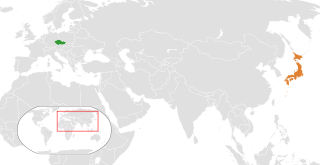
Bilateral relations between the Czech Republic and Japan were established in 1919 by Czechoslovakia and Japan.

The nations of the Czech Republic and Mexico established diplomatic relations 1993. Relations between both nations existed beginning in 1922 when the Czech Republic was part of Czechoslovakia until its separation from the union in 1992.
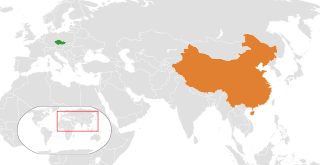
China–Czech Republic relations or Sino–Czech relations are international relations between China and the Czech Republic. There were official relations by 1919 and formally established relations followed on 6 October 1949 between Czechoslovakia and China. In 1993, the Czech Republic was established and inherited the Czechoslovak treaty. The relations, trade and tourism between the China and the Czech Republic improved rapidly since the 1990s; and in the 2010s, agreements were made for more thorough economic improvements. Recently, relations have deteriorated due to major Czech politicians visiting Taiwan.
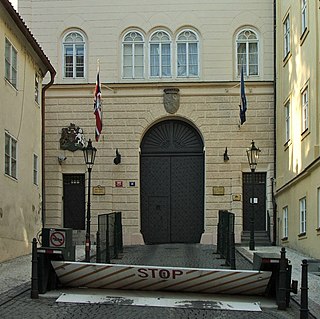
The British Embassy in Prague is the chief diplomatic mission of the United Kingdom in the Czech Republic. It is located in the Thun Palace, a historic building in the heart of the Malá Strana. The incumbent ambassador is Matt Field.

Czech Republic–Kurdistan Region relations are bilateral relations between the Czech Republic and the Kurdistan Region. The Czech Republic is represented in the Kurdistan Region through a consulate general in Erbil since 2006, while the Kurdistan region has no representation in the Czech Republic. Relations between the two are characterized by high level talks and cooperation against ISIS. Kurdish President Massoud Barzani visited the Czech Republic in 2015, meeting President Miloš Zeman and other senior government officials. In November 2015, Czech President Miloš Zeman said that he believes the Kurdistan Region will soon become independent.

Brazil–Czech Republic relations are the diplomatic relations between the Federative Republic of Brazil and the Czech Republic. Both nations enjoy friendly relations, the importance of which centers on the history of Czech migration to Brazil. Approximately 500 thousand Brazilians have Czech ancestry. Both nations are members of the United Nations.
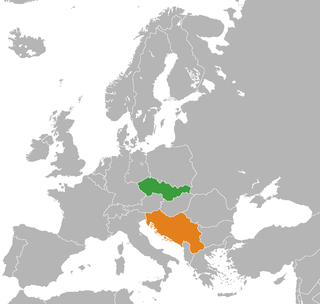
Czechoslovakia–Yugoslavia relations were historical foreign relations between Czechoslovakia and Yugoslavia, both of which are now-defunct states. Czechoslovakia and the Kingdom of Serbs, Croats and Slovenes were both created as union states of smaller Slavic ethnic groups. Both were created after the dissolution of Austria-Hungary, itself a multinational empire unable to appease its Slavic populations or implement a trialist reform in its final years.

Relations between Czechoslovakia and the United States refer to two periods in Czechoslovakia's history. The first being the establishment of Czechoslovakia after its declaration of independence in 1918 from Austria-Hungary initiated by President Woodrow Wilson as part of his Fourteen Points following World War I. The second period being the communist era from 1948 when relations were strained, until 1992 when Czechoslovakia split forming the independent nations of the Czech Republic and Slovakia as a result of the 1989 Velvet Revolution.





















